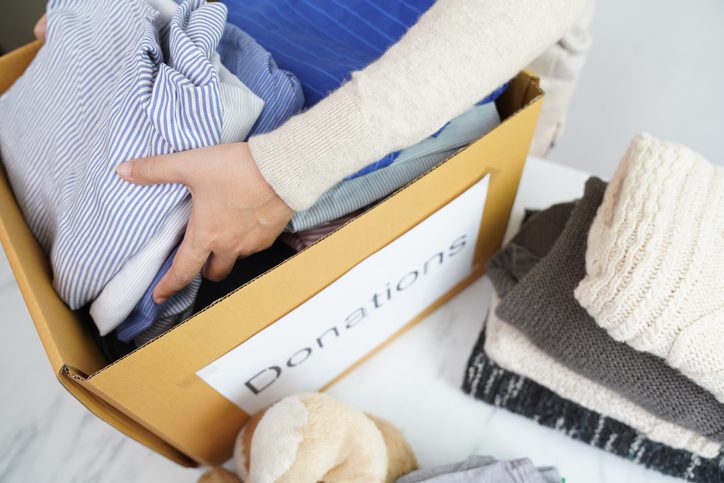North Carolina turns to its own manufacturers to address critical shortages of PPE and gowns.
The shortages of PPE, or personal protective equipment, has been one of the more frustrating, and surprising, aspects of this pandemic.
And among the hardest pieces of PPE to get in North Carolina? Medical gowns.
The state once known for textile production has struggled since the start of the global public health crisis to secure significant supplies of these surgical and isolation gowns needed by healthcare workers to keep the contagion at bay.
That’s because the Trump Administration’s strategic stockpile failed to come close to meeting the needs of communities responding to the pandemic. States have had to fend for themselves in securing the critical equipment.
For several weeks in April and May, North Carolina reported having no supply of gowns on hand at the warehouses monitored by the N.C. Department of Public Safety’s Emergency Management division.
Currently, there’s a less-than-30 day supply on hand as the state responds to requests for an average of 7,388 gowns each day from healthcare systems, nursing homes, doctor’s offices, mental health facilities and others providing care during the COVID-19 pandemic, according to an online dashboard maintained by the state tracking equipment supplies.
But stepping in to meet some of this need are North Carolina’s own manufacturers.
The Carolina Textile District, a Burke County-based cooperative of textile producers in the state, bought up 80,000 yards of the propylene needed to make protective gowns. Skilled seamstresses that normally do upholstery work at furniture manufactures like Ethan Allen, Geiger and Ekornes are now turning that propylene into gowns.
A cohort of seven N.C. manufacturers are now making 10,000 to 15,000 gowns a week, according to Kathryn Ervin from the Carolina Textile District.
One Greensboro company, Apple Rock, transformed its pre-COVID business model creating custom displays for trade shows and retail stores to a pandemic-era business of making branded face shields and gowns. The company, which employs about 90 people in its main Greensboro facility and another in Virginia, is now churning out thousands of these medical gowns each week, many intended to shore up North Carolina’s supply.
“When you’re in the business of making products that are helping save lives, it’s a definite good feeling and our staff feels that,” said Eric Burg, Apple Rock’s CEO and owner.
Not enough gowns to meet need
The state, as of Monday, had around 200,000 isolation gowns in its state-maintained warehouses. That works out to a 29-day supply, according to data maintained by the N.C. Department of Health and Human Services. That supply is below what state officials believe they need to respond to a spike in positive COVID-19 cases but is much higher than prior weeks when the supply had dwindled down to nothing.
“Our supply of isolation gowns is improving,” said Mike Sprayberry, N.C.’s Emergency Management Director during a media briefing Monday. “That item of PPE has been very hard to get.”
RELATED: ‘It Can Happen Here’: Gov. Cooper Warns NC Risks Repeating Turmoil In New York, Italy
Since the start of the public health crisis, the state requested more than 2.2 million medical gowns from the Strategic National Stockpile but has received just under 588,000 gowns. Nor has there been much success turning to the open market.
North Carolina officials have placed orders for 9.7 million gowns at the cost of $7.75 to $9.87 a gown. But less than 10% of those orders have come through so far, according to Keith Acree, a spokesman for the N.C. Department of Public Safety’s Emergency Management Division.
Sprayberry had been pleading for help in the early days of the pandemic in March, using his time on the daily media briefings to ask manufacturers to call if they could help.
Those pleas he made reached the staff at Apple Rock, where Burg, the owner, was dealing with his own crisis. The company normally creates stations and products that facilitate people meeting face-to-face at conferences. Pre-COVID, Burg was expecting 2020 to be one of his best years up, until COVID-19 arrived and eviscerated his entire business model almost overnight. But it, saw nearly all of its orders canceled in early March
“Within a five-day period, the entire business that we’re in … went away, to zero,” Burg said.
He and his management team tried to figure out ways they could stay afloat. They had the ability to cut and print on plastic, so started making branded face shields with their first batch headed to New York in mid-March.
Then they heard Sprayberry plead for medical gowns around that same time, and Burg realized there was a need in his home state he could potentially help with.
“This was our state, we need to do this,” he recalled thinking. “We can do this.”
Representatives from Apple Rock called up the state emergency management division to let them know they had the facilities and ability to start making medical gowns.
How many did they want?, Apple Rock representatives asked.
“’How many can you make?’’ was the response they got. The state would take whatever was available.
Within days, the two factories Apple Rock runs in Greensboro and Virginia with a workforce of 90 were transformed into gown production facilities.
Challenges from the start
It wasn’t a simple change to make, with early challenges in sourcing the needed material to create the gowns as the limited suppliers in the country were inundated with calls from others like him trying to buy up what they could. Burg also encountered problems finding enough sewing machines, elastic and even thread.
But Apple Rock was able to find a North Carolina producer willing to divert some of the gown material their way. The state contract has since signaled that the Apple Rock teams are legitimate buyers, making things easier.
There were also workforce issues, as Burg realized he needed more people with sewing skills than he had on his payroll. Burg is now hiring laid-off workers from elsewhere and training them up to become seamstresses in a state that decades ago made textiles and sewed clothing for the world.
“Sewing is kind of something that this country doesn’t do that much anymore,” he said.
After ironing out those initial issues, the Greensboro-based company sent its first shipment of gowns to the state of North Carolina in mid-April and has been producing thousands each week since.
The small company has sought to answer the call for other needs specific to the pandemic. They’re creating hand sanitizers stations and portable, lightweight hospital beds that Burg initially thought could be used to set up in field hospitals.
The need for those beds thankfully hasn’t materialized, as the surge of cases once feared as COVID-19 began to spread in the country didn’t occur. But Burg has heard from homeless shelter operators who need to find ways to give people shelter with enough space where the virus can’t spread unmitigated in close quarters.
His philosophy so far has been this: Find a need, fill a need. And Burg hopes that this flexibility not only keeps his company afloat, but also helps his state in a time of need.

Stay safe, Puerto Rico: The governor issues a state of emergency due to heavy rains, flooding
The executive order also authorizes the activation of the National Guard to assist in relief efforts. The Guard will be tasked with providing...

Jennifer López and Bad Bunny steal the spotlight at Met Gala 2024
The artists were co-chairs of the event, alongside Zendaya and Chris Hemsworth. Rauw Alejandro also attended. Puerto Rican artists Jennifer López...

5 places in Florida to donate clothes, shoes, and more
Decluttering your home can provide such a satisfying feeling of accomplishment. After sorting through all of your belongings and determining what...

8 Orlando hotels that pack as much fun as the theme parks
With waterslides, family arcades, playgrounds for the kids, and spas for mom and dad, these Orlando hotels will make your vacation unforgettable!...



